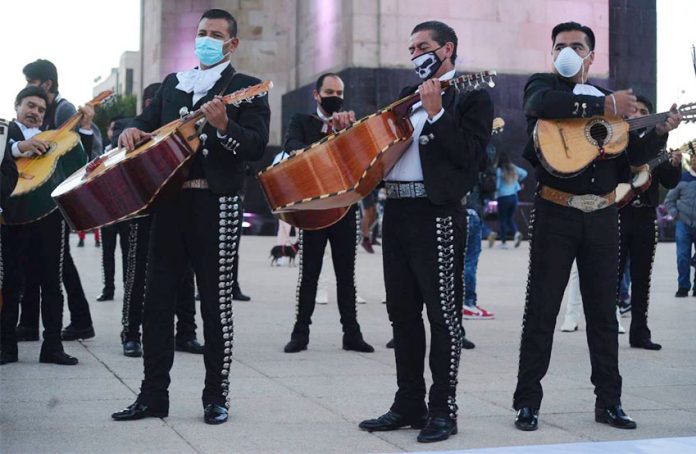They are one of the enduring symbols of Mexico, with their distinctive black suits and oversized sombreros. But, say the mariachis of Mexico City, the people behind the symbol won’t endure much longer if something isn’t done to help them during the coronavirus pandemic, which has dealt the city’s traditional musicians an economic death blow.
“We are at the point of dying,” says Hermino, a Mexico City mariachi and member of Salvemos al Mariachi (Let’s Save the Mariachis), a group of the city’s traditional musicians who gathered Sunday at the city’s Monument to the Revolution in the city center to give a free, socially distanced concert to publicize their cause.
“We feel alone and isolated from a policy that [Mayor] Claudia Sheinbaum said would be inclusive, but it’s not.”
The group wants the city to give financial help it promised to ease the economic plight that Covid health protocols prohibiting public gatherings have forced upon them.
The city’s mariachis are famously a fixture at places like Garibaldi Plaza, public gathering spots in the historic center that normally attract tourists who pay to hear the musicians play Cielito Lindo and El Rey. But these sites have been closed to the public since March due to Covid.
#SalvemosAlMariachi | En el #DíaDelMúsico, Mariachis 🎺🎻 se manifiestan pacíficamente en el Monumento a la Revolución, ante la falta de apoyo durante la pandemia: https://t.co/EgmSV8jiOO#Video | @GaleanaDanielo pic.twitter.com/BwA3eHIV6z
— El Sol de México (@elsolde_mexico) November 23, 2020
Even worse, the real bread and butter of these musicians is large private gatherings like weddings or birthday parties, which have been prohibited for months.
Musicians have been clinging to hope after government promises of economic support were made to them early in the pandemic, but money has been slow in coming or nonexistent, they say.
Andres Navarro says the city’s labor department has failed to come through with financial payments it promised nine months ago. He also accused the Cuauhtémoc borough government of having convinced 18 mariachi groups to perform for the public on Independence Day, September 15, without paying them.
“It’s unfair that they made us work and at the end of the day, they haven’t given us a peso,” Navarro said.
The choice of yesterday’s date for the gathering was not an accident: on November 22, Mexico City normally hosts a free mariachi concert in Garibaldi Plaza each year in honor of Santa Cecilia, the patron saint of musicians. The event attracts thousands of people for dancing, drinking, partying, and singing. Naturally, the event did not happen this year.
It is a day that would normally employ many a mariachi.
They may symbolize Mexico, say Hermino and his fellow musicians, but mariachis been largely forgotten. About 5,000 families are believed to be dependent on Mexico City’s mariachis, he said, but they haven’t been able to work for half a year.
“The authorities haven’t given us the necessary support. They don’t even know how many we are … We already don’t have Garibaldi, we don’t have anything. We are a species in a terminal phase if things don’t get better or [the pandemic doesn’t] end soon,” he said.
Source: El Universal (sp)
